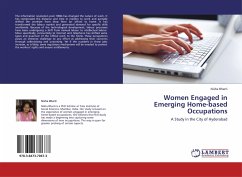The information revolution post 1980s has changed the nature of work. It has compressed the distance and time in relation to work and partially shifted the worksite from shop floor (or office) to home. It has transformed the labour market and generated demand for specific skills worldwide. Because of the technological development, labour processes have been undergoing a shift from manual labour to intellectual labour. More specifically, connectivity to internet and telephone has shifted some types and quantum of the official work to the home. These occupations poses an immense challenge to any effort at addressing their concerns through collectivising and unionising. Yet if the numbers in these jobs increase, as is likely, some regulatory mechanisms will be needed to protect the workers rights and ensure entitlements.
Bitte wählen Sie Ihr Anliegen aus.
Rechnungen
Retourenschein anfordern
Bestellstatus
Storno








